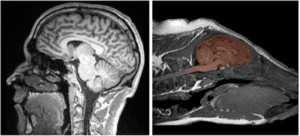From cattle to canines, innovators in the department of Animal Sciences work with a variety of animals. In addition to training future veterinarians and leaders in the livestock industry, faculty and students create innovative ways to help us understand human health.
For example, how can studying piglets help us understand human babies? Dr. Ryan Dilger and a team in the Nutrition, Health, and Neuroscience Laboratory looked at the relationship between different components of milk and brain development in piglets.
As the image below shows, humans and pigs have similarly shaped brains. Even though human brains grow ten times larger than those of pigs, both brains grow in the same way. In addition, special cells called neurons make up both types of brains.

Shortly after birth, human and pig brains grow faster than any other point in their development. At this time, human and pig neurons undergo a process called myelination. During myelination, a substance called myelin wraps around the axons of neurons. Neurons use axons to transfer information. Thick layers of myelin make these transfers more efficient. Since fats and proteins combine to make myelin, baby humans and pigs need healthy fats from milk or milk substitutes. Understanding which components of milk encourage growth in piglet brains can help future innovators research human brain development!

- Nutrition, Health, and Neuroscience Laboratory, inside the Beckman Institute – This is where Dr. Dilger and his colleagues conduct their research.
Dilger, R. (n.d.). Home. Nutrition, Health, and Neuroscience Laboratory. https://publish.illinois.edu/rdilger2/.
Mudd, A. T., Alexander, L. S., Waworuntu, R. V., Berg, B. M., Donovan, S. M., & Dilger, R. N. (2016). Dietary Prebiotics, Milk Fat Globule Membrane, and Lactoferrin Affects Structural Neurodevelopment in the Young Piglet. Frontiers in Pediatrics 4. https://doi.org/10.3389/fped.2016.00004.
